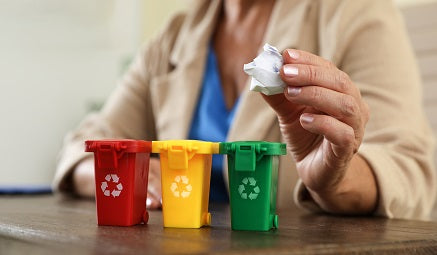An average Indian creates over 0.5 kg of waste in a day. It's not an intimidating number, in fact, it is much lower than the global average. But when you imagine 138 crore people creating 0.5 kg waste every single day, the number doesn't sound so harmless anymore, does it?
You don't have to go zero waste to help the situation. Making small swaps and switching to a low waste lifestyle can make big changes.
Here's how you can start:
Buy multipurpose products:
Don't worry, we are not asking you to use the abomination called the 3-in-1 body wash cum shampoo. Just opt for products that can be used for a multitude of things even if they are not marketed that way. For instance, you really don't need a hand cream or neck cream, your usual moisturizer will do the job efficiently.
In terms of home cleaners instead of buying specific cleaners you can go for multi-surface cleaners like The Better Home's multi-purpose cleaner that tackles dirt and grime on all nooks and surfaces.
Also, once you have used up the product, you can upcycle the packaging and container. Use up plastic bottles to make planters and smaller containers to store herbs and spices in the kitchen. With each plastic container you upcycle, you are slowing down the waste menace.
Circular economy:
As consumers, we are buying and consuming products that we want and need and the waste generated from it goes into the landfills. To close this cycle of waste generation, adopting a circular economy is the way to go. Many brands are incorporating this approach where they use the waste from the manufacturing process to create new products.

But how can you do it at home?
Composting is an easy and simple way to adopt this approach. Compost your food scraps and fertilize your plants with it.
Eco bricks:
Eco-bricks are a crafty way of solving the single-use plastic problem that is plaguing the world. Most of these plastics cannot be recycled and end up in landfills. So instead of dunking them in your dust bin, give them a new life.
Eco-bricks are fairly easy to make, take a plastic bottle or container and tightly pack it with unrecyclable plastic and things that cannot be recycled or upcycled in anyway. That's all! Once you have made enough bricks, use them to build outdoor walls or large planters for your garden. You may even find NGOs who are accepting eco-bricks as a part of their larger projects – keep an eye out for these!
Remember eco-bricks are a commitment that you cannot dump half way through – this will create more waste as eco-bricks are not recyclable, while a regular single-use plastic bottle still is!
Waste management:
Waste management is the first step towards your low waste journey. Make sure to always segregate your waste. Biodegradable waste can be composted and put to use in your garden but when it comes to dry waste, it gets a little tricky.

Not everything in your dry waste bin will be recycled, most of it will end up in landfills. So, while segregating check for things that you can reuse at home. Moreover, opting for products that are biodegradable, to begin with, will help cut down the waste you produce.
For instance, swapping your dish scrubber to The Better Home's biodegradable coconut scrubber or using our biodegradable garbage bags are some small but significant changes that you can make.
Invest in quality products:
Don't be penny-wise pound foolish! Products with a cheaper price tag may seem like a good deal but when it comes to longevity and quality, does it fare well?
Instead of going by the price tag, look at the features. For instance, sustainable and eco-friendly cleaning products usually come at a higher price because they are made ethically in smaller batches.
Making that conscious choice to opt for something that is good for you and the environment will definitely pay off in the longer run.

